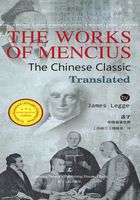
CHAPTER XII
1. There had been a brush between Tsâu and Lû,when the duke Mû asked Mencius, saying,'Of my officers there were killed thirty-three men, and none of the people would die in their defence. Though I sentenced them to death for their conduct, it is impossible to put such a multitude to death.


其宗庙, 其宗器, —其= 'its or his', i.e. the kingdom's or the prince's, not their, the people's.
4. 旌, 4th tone, used for 耄, 'people of eighty and ninety'. The clauses after the first are to be understood as the substance of the order or ordinance, which Mencius advised the king to issue.
CHAPTER 12. THE AFFECTIONS OF THE PEOPLE CAN ONLY BE SECURED THROUGH A BENEVOLENT GOVERNMENT. AS THEY ARE DRAIT WITH BY THEIR SUPERIORS, SO WILL THEY DEAL BY THEM.
1. Tsâu, the native State of Mencius, was a small territory, whose name is still retained, in the district of Tsâu-hsien, in Yen-châu of Shan-tung. 哄 is explained—'the noise of a struggle'. It is a brush, a skirmish. Tsâu could not stand long against the forces of Lû. Mû,


If I do not put them to death, then there is the crimeunpunished of their looking angrily on at the death of their officers, and not saving them. How is the exigency of the case to be met?'
2. Mencius replied, 'In calamitous years and years of famine, the old and weak of your people, who have been found lying in the ditches and water-channels,and the able-bodied who have been scattered about to the four quarters, have amounted to several thousands.All the while, your granaries, O prince, have been stored with grain, and your treasuries and arsenals have been full, and not one of your officers has told you of the distress. Thus negligent have the superiors in your State been, and cruel to their inferiors. The philosopher Tsăng said, "Beware, beware. What proceeds from you, will return to you again." Now at length the people have paid back the conduct of their officers to them. Do not you, O prince, blame them.
3. 'If you will put in practice a benevolent government,


—'the Dispenser of virtue, and Maintainer of righteousness, outwardly showing inward feeling',—is the posthumous epithet of the duke. 有司 are to be taken together,= 'officers';—see Analects, VIII.iv. 莫之死 is to be completed 莫 (or莫肯) 为之死;compare Analects, XIV. xvii. 则疾视云云 is not to be translated,—'they will hereafter look angrily on, &c.'; the reference is to the crime that had taken place.
2. 凶年=years of pestilence, and other calamities,such as are immediately described. 夫, 1st tone,indicates the application of the saying. 今而后= 'now at last'.—They had long been wishing to show their feeling, but only now had they found the opportunity. 反之,—之 refers to the 有司.
3. 其上,—embracing the prince and officers generally; 其长 (the 3rd tone), the officers only. 死其长,—to be supplemented, as in par. I.


this people will love you and all above them, and will die for their officers.'